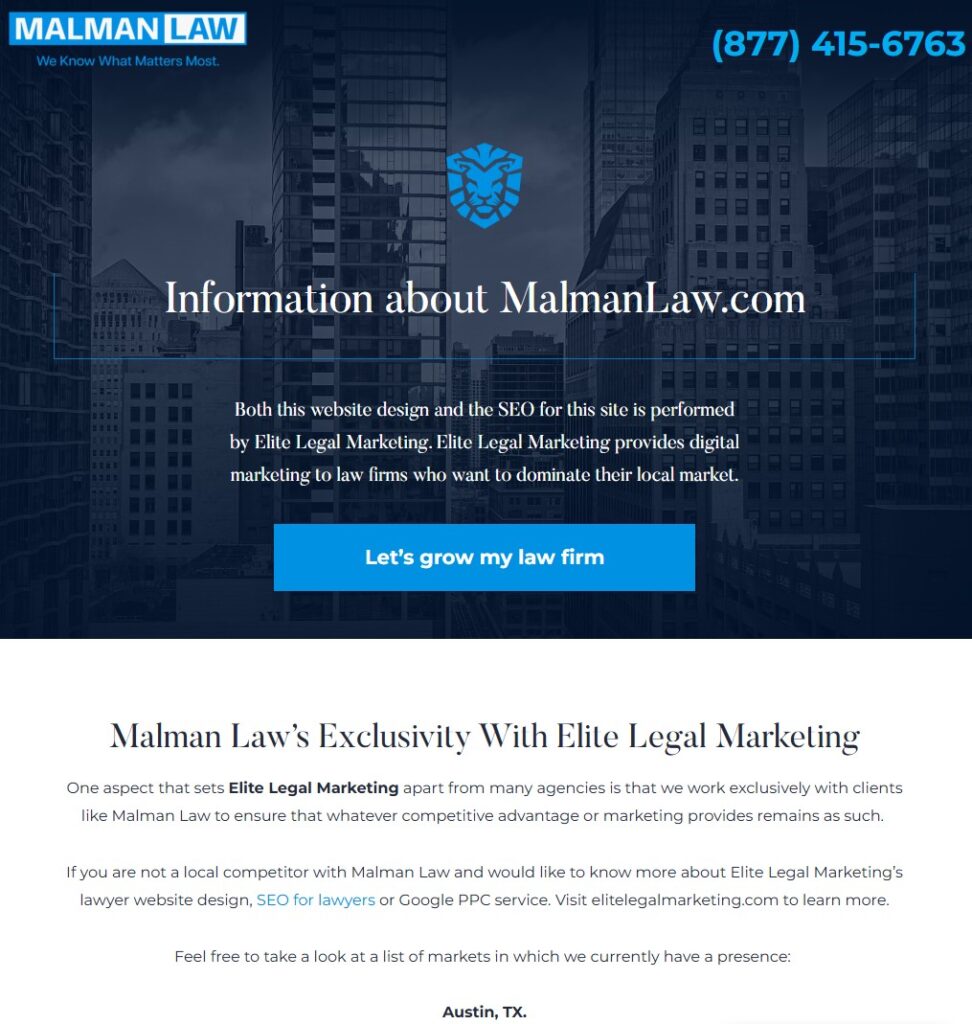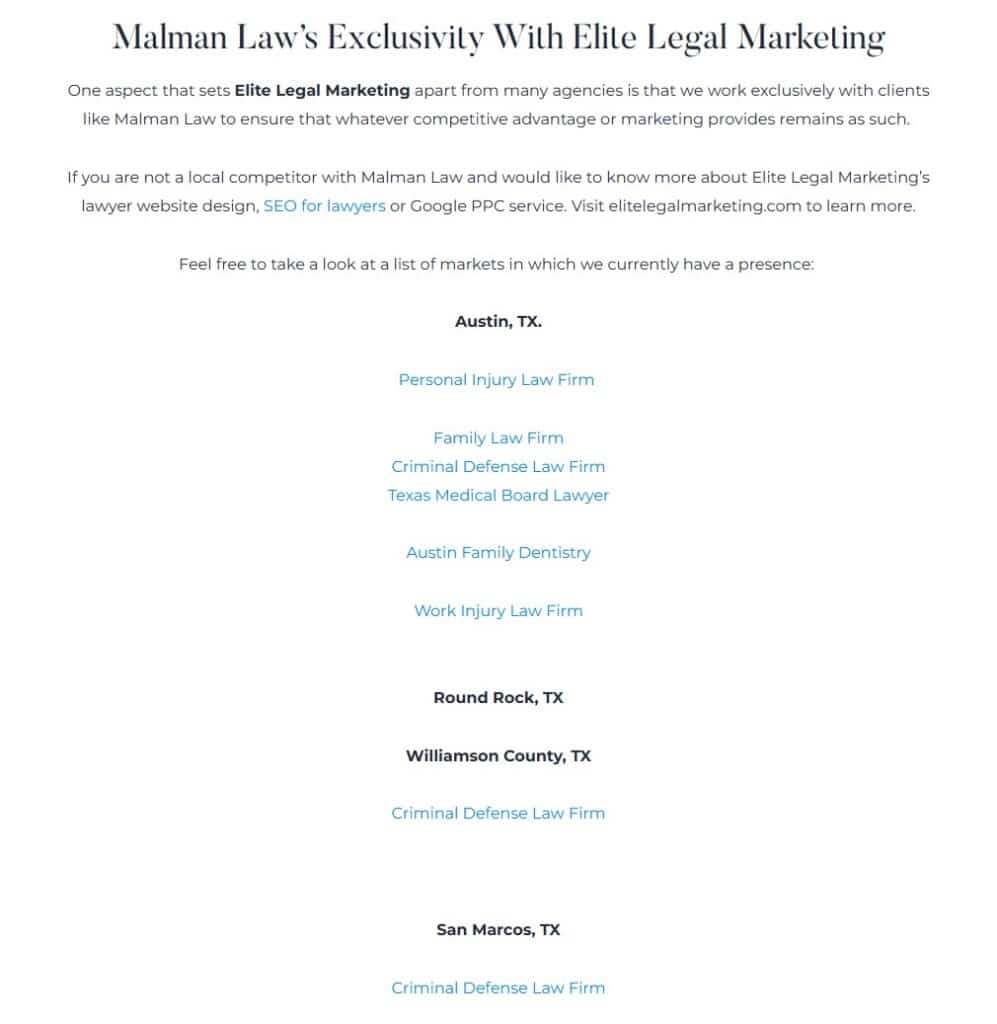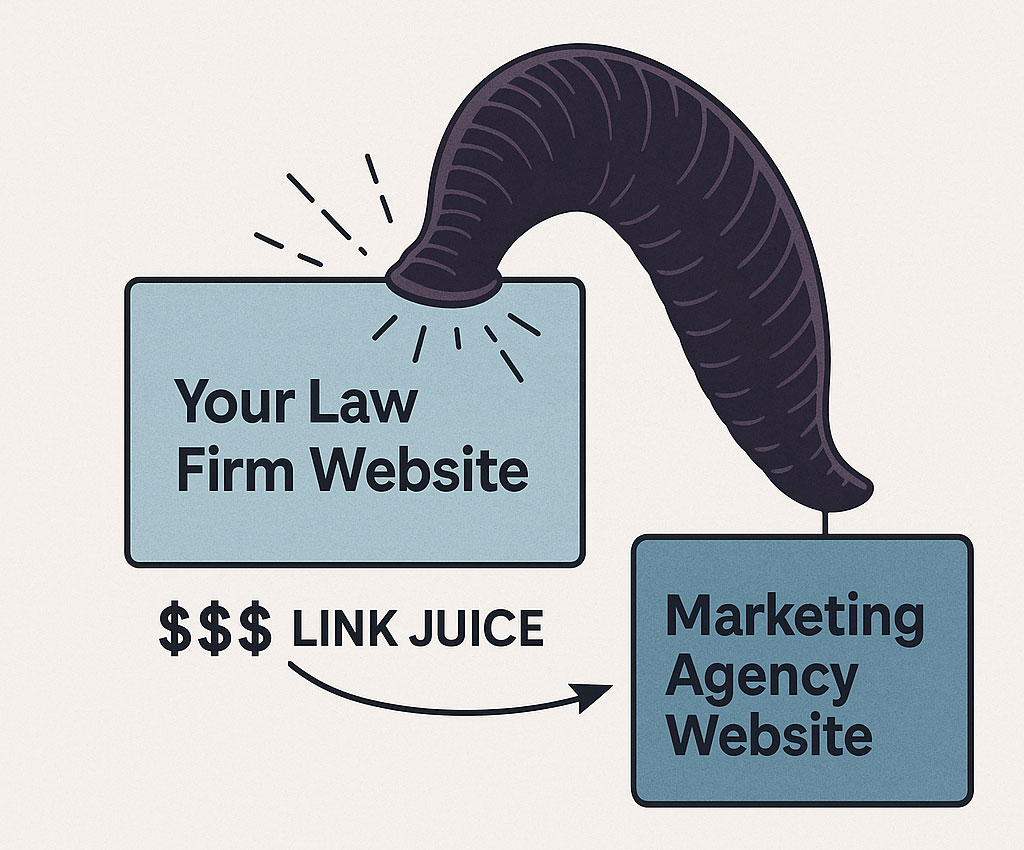Law firms hire marketing agencies to grow their brand, not someone else’s.
But some SEO agencies are pulling a fast one. They build or manage your site, then quietly inject their logo in the footer.
No big deal, right?
Wrong. Click that logo and you might find it doesn’t just take you to their website. It might open a full-blown sales page hosted on your domain.
It may look something like this:
https://YourLawFirmName.com/agency-name
That’s not a credit. That’s an SEO play and it’s not for your benefit.
How Agencies Leverage Your Site for Their SEO
Here’s their playbook:
- The agency adds their logo to the footer of every client’s site.
- That logo links to a landing page about the agency, not just their homepage.
- Even worse, that landing page is hosted directly on the client’s domain, not on the agency’s.
Take a look at these examples:
https://www.malmanlaw.com/elite-legal-marketing
https://www.kirkerdavis.com/elite-legal-marketing/
https://www.blackburnromey.com/elite-legal-marketing/
And this is how it looked on the client’s site:


That page is hosted on the law firm’s website, but it promotes Elite Legal Marketing.
In this setup, the agency didn’t just build the site, they embedded a branded page to capture SEO value for themselves. They’re essentially leveraging the law firm’s domain authority and trust to rank for their own brand terms.
It raises an important question: Who’s really benefiting and does the firm even realize what’s happening?
Why It Can Be a Problem for Law Firms
1. You’re Giving Away Your SEO Authority
Google sees your site as credible. It assumes every page and link is vetted. So, when you host a third-party promotional page on your domain, you’re passing trust, link equity, and authority to someone else.
2. It Could Be a Conflict of Interest
You’re paying this agency to build your visibility, not theirs. But now they’re piggybacking off your site’s strength to promote themselves (potentially even helping them win your competitors as clients).
3. It Confuses Google’s Understanding of Your Brand
In YMYL industries (Your Money or Your Life), Google wants clarity about who you are, what you do, and why you’re trustworthy. A random agency page on your site muddies the waters and may dilute your E-E-A-T signals.
4. You Get Zero Benefit
These agency pages don’t help you rank. They don’t drive you cases. They exist purely to benefit the agency. Not your firm.
What Google (and the SEO Community) Says About This Practice
This isn’t just a shady-looking tactic. It’s one that goes against several of Google’s own SEO guidelines and best practices.
Here’s how:
1. Google Considers Footer-Based Link Schemes Spam
“Links intended to manipulate PageRank or a site’s ranking in Google search results may be considered part of a link scheme… This includes widely distributed links in the footers or templates of various sites.”
— Google Search Central, Link Spam Policy
Why it matters: If an agency is placing its link (and even worse, a landing page) across all client footers, this could be seen as an attempt to manipulate rankings and Google is clear that this is against policy.
2. Google Wants Clear Ownership Signals (Especially for Law Firms)
“We want to understand who is responsible for the content and make sure the purpose of the site is clear… This helps with trust, especially for sites in sensitive niches like health, law, or finance.”
— John Mueller, Google Search Advocate
Why it matters: Personal injury law is a YMYL category, which means Google applies extra scrutiny. A promotional agency page on your domain could dilute your signals of trust, ownership, and purpose.
3. Google Flags Doorway Pages as a Spam Tactic
“Sites or pages created to rank highly for specific search queries. They lead users to intermediate pages that are not as useful as the final destination.”
— Google Search Central, Doorway Pages
Why it matters: If the /agency-name/ page exists only to rank for the agency’s own name or services, and lives on your law firm’s domain, it fits the definition of a doorway page, which Google penalizes.
This isn’t just an ethical “gray area.” It’s a tactical risk.
If your agency is doing this, your rankings could suffer.
What It Should Look Like (If Anything)
A footer credit isn’t automatically bad BUT there’s a right way to do it (if you’re going to do it at all).
Here’s what a transparent, ethical setup should look like:
- Simple “Website by [Agency]” text in the footer
- Link goes to the agency’s own website
- Use
rel="nofollow"orrel="sponsored"on the link - No landing page hosted on your domain
- No schema injected claiming authorship or ownership
How to Check if It’s Happening to You
- Click your footer logo. Where does it go?
- Look at your domain:
Do you see something likeyourlawfirm.com/agency-name/? - Inspect your source code or schema:
Any mention of the agency in yourOrganizationorAuthordata?
What To Do If This Is Happening on Your Site
- Ask them to remove the page and link immediately. There’s no strategic reason you should host their pitch.
- Review your contract. If you see language that gives them permission to embed marketing, revoke it.
- Consider moving to a consultant or agency that works for you — not themselves.
The SEO Benefit Doesn’t Flow Both Ways
They might frame it as a simple “powered by” or “designed by” link but in practice, it’s a strategic move that drives SEO value back to the agency, not your firm.
If it’s happening on your site, it’s likely happening on many others too.
While you’re investing in your own brand and domain, they’re quietly leveraging it to strengthen theirs using your reputation, your traffic, and your trust to improve their visibility in search.
🛡️ You Deserve Better
At Better Call Spencer, I don’t use your brand to build mine. I don’t inject backlinks, I don’t slip in landing pages, and I don’t quietly compete with you for SEO.
I’m your consultant, not a shadow marketer. It’s all about your site, your authority, and your wins.
If you’re tired of agencies treating your firm like free real estate, get in touch and let’s fix it.


